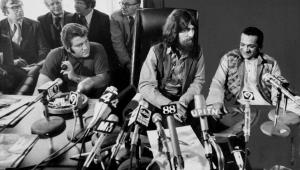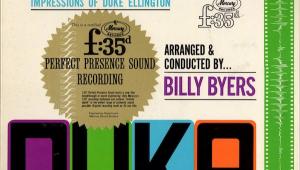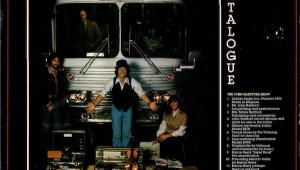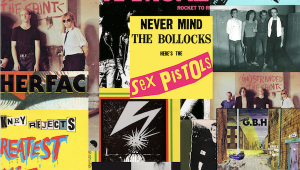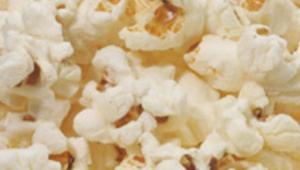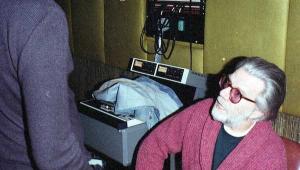Round and Round: The Sound of The Rolling Stones on Record
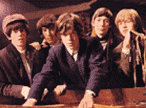
If Exile On Main Street exuded the \"high\" of drug use, 1973\'s Goats Head Soup (Rolling Stones Records COC 59101) represented the \"down\" side: a listless, keyboard heavy (Nicky Hopkins, Billy Preston, and longtime background Rolling Stone Ian Stewart) mess.
If Exile On Main Street exuded the "high" of drug use, 1973's Goats Head Soup (Rolling Stones Records COC 59101) represented the "down" side: a listless, keyboard heavy (Nicky Hopkins, Billy Preston, and longtime background Rolling Stone Ian Stewart) mess.
Recorded by Andy Johns at Dynamic Sound Studios Kingston Jamaica, the sound lowers to the occasion. For some Stones watchers, this album signalled the end of the group. By this time, you had five adults leading separate, jet setting lives. Mick the socialite, Keith the heroin addict, Charlie Watts the country gentleman and big band enthusiast, Bill Wyman? who knew? and Mick Taylor the blues academician still on the fringes. Could these five still be a rock and roll group? No, judging from this sad package. Just listen to "Coming Down Again" and wince. Look at Keith on the back cover wrapped in a near death mask.
The Stones dead? It's only Rock'n Roll (Rolling Stones Records COC 79101) surprised everyone with its energy and reinvigorated sense of purpose. It still wasn't an inspired set, or a particularly well arranged and executed one, but at least it rocked, with songs like "If You Can't Rock Me", and "It's Only Rock'n Roll". There are some chilling moments too like the drug fueled paranoia of "Fingerprint File. Still, this was not so much a production as a product pasted together, one which went out the door more because of professionalism than inspiration. Holes where filled rather than structures built.
Recorded in Munich Germany with the help of the piano trio on Goats Head Soup plus a half dozen others, this is more of a Glimmer Twins production than an effort by a working band. More of a studio creation than a document of a band's progress. But that's the direction in which the disspirited musical form called rock and roll was heading anyway.
Not a great sounding record by any standard. On the American pressing, Charlie Watt's drum kit is lumpy, dark and distant, with no cymbal shimmer or dynamic excitement. Everything in the midrange, from guitars to keyboards are muddy and indistinct, and the vocals are goosed up on top, creating an unpleasant overall sound.
The Japanese issue (Warner-Pioneer P-10132S) while bright on top, at least breathes life into Charlie's drum kit and is far better balanced overall, with good punch to Wyman's bass, though Mick's sibilent's will sear your ear drums. What's most interesting here, is that the lacquer was cut at Atlantic so the sonic differences are attributable either to a request for EQ variance from the Japanese, or to plating and pressing.
Do yourself a favor and ignore Made In The Shade a 1975 compilation that's totally unnecessary and skip to Black and Blue (Rolling Stones Records COC 79104) released in 1976, but culled from sessions recorded between the fall of 1974 and the spring of1975 mostly in Munich, Germany. A mixed bag, with some great tracks like the hard rocking "Hand of Fate", "Fool To Cry" and "Memory Motel" and some hard funk like the opening "Hot Stuff" an insistent, six minute one vamp tune-almost a parody of contemporary black music at the time- which put many a Stones fan off.
There's plenty of filler too, like a note for note cover of Eric Donaldson's Reggae hit "Cherry Oh Baby", complete with Mick's el- lamo Jamaican patois. For a really good time, hunt down a copy of Twenty Reggae Classics (Trojan TRLS 222) a British compilation of original reggae hits turned into pop tunes by others. The set includes "Cherry Oh Baby", "Red Red Wine" (originally sung by it's composer Neil Diamond, turned into a reggae hit by Tony Tribe, and then covered again by UB40), "Sweet Sensation", "Love of the Common People" and many other songs so treated.
With Mick Taylor gone from the group, Ron Wood and Harvey Mandel shared guitar assignments with Keith. Perhaps the departure of the mannered technician lightened up the atmosphere. Whatever it was, this is a stronger, more focused set than Its Only Rock and Roll , though a wildly uneven one.
Mastered by Lee Hulko at Sterling Sound in New York, the sound is more open, immediate and far better balanced than its predecessor. Worth picking up in the used bins for cheap, to get the few choice tracks.
Do yourself another favor and avoid Love You Live (COC 2-9001) a two LP live set from 1977. Lazy, sloppy, disspirited: it seemed like there was only one way to go from here: Las Vegas. Mick's phrasing makes the current Bob Dylan sound succinct. Too bad the sound is so accomplished.
Given the downward direction in which the Stones were heading, who could have ever expected a spectacular recovery like 1978's Some Girls (Rolling Stones Records COC 39108)? Back to basics, the album does away with the horns, and the keyboardists. With Ron Wood now a full fledged Rolling Stone, a guitar band was once again a possibility. "When The Whip Comes Down" was all Stones fans had to hear to know the group was back to full power. Even the cover of the Motown classic "Imagination" worked.
Though short on uptempo ravers, Some Girls rocks hard from start to finish, with deliberate mid-tempo tunes, rife with the raunch and humor that mark great Stones songs. When Mick sings "we're talking heroin with the president"on the Chuck Berry-ish"Respectable", or "shmata, shmata, shmata, I can't give it away on seventh avenue"! on "Shattered" you just gotta laugh. (You know what a shmata is, don't you?)
But when Keith, then suffering under the weight of a giant Canadian heroin bust sings "After all is said and done, I did all right and had my fun, But I will walk before they make me run.", you stop in your tracks. The only false note on the record is Mick's Bakersfield drawl on "Far Away Eyes" a song which isn't sure if it wants to celebrate the country strain or mock it.
Even the lingerie catalogue packaging is classic Stones: campy, androgynous and suitably offensive. So much so that some of the female stars "morphed" with Stones faces (before computers could knock this stuff off with ease) sued. Only early pressings have the photo insert with Marilyn Monroe, Lucille Ball, Red Buttons, Racquel Welch, Jayne Mansfield, and the others. Later versions had many of the hilarious photos blocked out.
The sound is exemplary here: mostly engineered and mixed by Chris Kimsey at E.M.I. studios, Paris. Charie Watts' drum kit is meaty, dynamic and one of the musical and sonic highlights of the record. Keith and Ron's guitar lines are presented left/right with utmost clarity and warmth. The bottom foundation provided by both Charlie's kick drum and Wyman's bass is tight, focused and deep. Mick's voice is given plenty of space centered between the speakers in a masterful mix. All in all the finest sounding post Decca Stones album.
I compared Japanese, British, American, Dutch and Mo-Fi pressings. Most fascinating is that though the first three were mastered by Ted Jensen at Sterling, all sound different. By far the finest sounding is the British pressing, with the deepest, tightest bass and the most cleanly rendered high frequency transients. Second best is the Dutch orange vinyl pressing which was widely circulated in the United States in the late seventies. It lacks the bottom end sock of the British, but offers a creamier midrange and sweeter highs which some audiophiles might prefer. Least preferable is the American pressing which sounds somewhat muddy and indistinct below and lacks shimmer and excitement on top.
While some of this is probably due to normal pressing variability, I think plating, pressing cycle time and vinyl formulation differences are the keys to the varied sound quality. The Mo-Fi is quite good, with excellent high frequency transients and decent bass, but it lacks the palpable, articulate low end sock of the British version and is missing the midband warmth of all the other versions. The quiet vinyl and inner detail resolution make it worth looking for, though expect to pay a premium- about thirty bucks.
Entropy in the Eighties?
By 1980 when Emotional Rescue (Rolling Stones Records COC 16015) was issued, The Clash were big stars and punk and new wave had invigorated rock and roll. And while the disco backlash had already occured, there was still plenty of booty being shaken in gay bars and other places. So Emotional Rescue covers all bases, opening with "Dance" another groove based track with hints of disco and reggae. "Summer Romance", a breakneck refinement of "Lies" from Some Girl s follows. The next track, "Send It To Me" is another reggae tinged number, but all three, like "Let Me Go" a mid tempo rocker which follows, shows a band refining and compacting its sound with Charlie Watts better than ever, if that's possible, and Keith and Ron Wood meshing like the movement in a fine Swiss watch. It's rock but with a subtlety that verges on jazz, filled with dozens of fresh new sophisticated licks and rhythms. There's a drive here signalling a move into new territory and a seriousness of purpose that leaves the self caricature of Sticky Fingers and Some Girls in the dust. The subtlety left some Stones fans cold.
Mick gives his best recorded vocal performance on the down and out bluesy "Down In The Hole" (a message to Keith?), with Ron and Keith laying out guitar parts worth savoring again and again. The title song finds the Stones in alien territory: Mick in a campy, macho falsetto, Charlie doing a straigh 4/4 time disco kick drum beat, Bill Wyman hinting at a jazzy walking bass line- and there's even an erased synth track peeking out of the silence.
The album ends with two stunners: the rocking "She's So Cold" and Keith's devastating, vicious "All About You" aimed at his long time girlfriend Anita Pallenberg. In a world weary voice, Keith sings "If the show must go on, let it go on without you. It's so sickening its a crime, hanging around with jerks like you."
This is one of the two best sounding Stones albums of the Rolling Stones Records era, with seemingly no electronic distance between you and the band. The crack of Charlie's snare drum is absolutely stunning, as is the kick drum and cymbal work. Guitar parts are cleanly articulated, with the effects overlayed in a way which allows you to hear both the physical playing and the patch through the electronics. Vocals are also clean and natural and the overall frequency response and dynamic range are as broadband and wide as on any Stones album before or since.
The Japanese pressing (EMI-Toshiba ESS-812850) offers pristine clarity, outstanding instrumental separation, and deep, tight bass. Highs are crystalline and pure, and image focus in nothing short of astounding. But there is a clinical precision which will be offputting to some. The Ted Jensen mastered original is warmer in the midbass, and hangs together better, but the kick drum is an amorphous thump by comparison, and transparency and overall focus suffer. Still, you'll easily find copies of this in the bins or at garage sales for a few dollars, while you'll be lucky to find the Japanese pressing, and if you do, it'll cost you plenty.
It's kind of sad hearing "Start Me Up" used as Microsoft's "Windows 95" theme song and turned into a football stadium anthem but neither takes away from the power of the song, which opens the most musically accomplished, and best sounding post Decca Rolling Stones album, and one of the best albums of the band's entire career.
Released in 1981, Tattoo You is as fresh and exciting today as it was when issued fourteen years ago. A mature work by a bunch of older bloke rock and rollers who have not gone to seed. That it was released eighteen years after the band's first single and eleven years after the Beatles last album is a thought worth pondering.
Packed with towering Keith Richards riffs, Mick's no bullshit singing and the best rhythm section in rock playing at its peak,
Tattoo You is the Stones' vinyl resurrection, aided by a superb Chris Kimsey recording and Bob Clearmountain's seamless mix.
While no one is credited with the sax parts, rumor has it that Sonny Rollins played them. Skeptics need only listen to the end of "Waiting On A Friend". Whoever it is plays with the authority of Rollins, adding unexpected twists and turns to the part- the kind one would expect from a jazz musician "slumming" it on a rock record.
"Worried About You" has the feel of the most mature Motown, "Little T&A" the decadence of vintage Stones, "Tops" the grace and stately authority only a mature outfit could pull off, "Heaven" a sensuality which marks a new relationship between the Stones and sex, and "Waiting On a Friend" the heartfelt, burnished warmth only natural weathering can provide.
The best way to hear Tattoo You on vinyl is the Japanese pressing (EMI-Toshiba ESS-81455) which offers everything stated previously about the Japanese pressed Emotional Rescue , but with more warmth in the midbass. The American pressing so pales by comparison that I chucked a while back- a move I regret both because why get rid of any clean vinyl? and because now I can't give you the catalogue number.
The End of The Atlantic Era: Sad, Sad, Sad
Still Life (Japanese EMI-Toshiba ESS-81502) a live album from the successful 1981 tour is dispensible. In the summer of 1983 at a 3AM meeting in a Paris hotel, Mick and Keith signed a twenty-eight million dollar, four studio album deal with CBS' Walter Yetnikoff who must have been suffering from a serious case of jetlag, especially since the deal did not include CD reissue rights to back catalogue!
That fall the Stones issued Undercover (Japanese EMI-Toshiba ESS-91070) as part of its Atlantic Records deal. Mick Jagger had turned forty years old. The album builds on Tattoo You , one upping it in sophisticated simmering propulsion, but with a few notable exceptions like "She Was Hot" where Keith sings about a woman as if she was an automobile, the rock part of the equation has been filtered out. The exquisite structure of Tattoo You has been replaced by jams and when the Stones go for the magic of the previous release they repeat themselves as on "Too Tough". The record sounds like formula.
Many of the lyrics take on a jet setting world tone- not surprising since the members of the Stones have spent the previous year flying all over the world- mostly separately- getting together in short bursts to produce the record. Mick's vocals also seem perfunctory and unconnected. Still, Undercover makes for pleasant listening, as the well oiled machine rolls on, perhaps a bit too lubricated- in every sense of the word.
Sonically Chris Kimsey comes up with the goods again, this time a bit smoother and more understated. With much of the rocking tension gone from the music, the sound takes on a glassy flow which goes down smoothly and evaporates from the mind with equal ease. Undercover is by no means a flop, but it is not an essential Stones album. Again the Japanese pressing beats the American by a wide margin and by the same criteria as the previous few releases.
For you video freaks: in November of 1984 Vestron Video releasedVideo Rewind (MB1016 Beta Hi-Fi, also VHS) a compilation of the Stones' greatest video hits with humorous new footage of Bill and Mick as links- and some raunchy home movies thrown in.
Meanwhile, by this time each of the Stones was doing his own thing: Mick was recording a solo album, Bill's had his "Willie and The Poorboys" group featuring Charlie Watts, Jimmy Page and Paul Rodgers among others, doing covers. Originally on Ripple records it was reissued last year on Blind Pig CD (BPCD 5009). Its fun.
In December of 1984 the Stones released "Too Much Blood" from Undercover , as a twelve inch single- the groups last Atlantic issue.
Finally, in January of 1985, recording commenced on the Stones' first CBS LP. Mick's album She's the Boss (Columbia FC 39940) was released February of that year. Despite an all star lineup including Pete Townshend, Herbie Hancock, Jeff Beck, Nile Rodgers and many others, the record was not particularly well received by either the press or the public.
In December of 1985 Ian Stewart, an original Rolling Stone and longtime keyboardist for the group both on stage and in the studio, died of a heart attack in London at the age of forty seven. His funeral was attended by all the Stones, Eric Clapton and Jeff Beck.
Usually when an artist or a group jumps labels, the move has an invigorating effect: as when James Taylor moved from Warners to Columbia, Paul Simon from Columbia to Warners, or Bonnie Raitt from Warners to Capitol. But when the the Stones moved to Columbia, they didn't fare so well.Dirty Work (Columbia OC 40250) released March of 1986, co-produced by the Glimmer Twins and Steve Lillywhite, and engineered by Dave Jerden, sounds digital and like a rushed bit of "product". Even Charlie Watts sounds hackneyed, or perhaps it's just that this is the worst drum sound of his recorded career. Wanna hear how big a dip recorded sound quality took with the introduction of digital sound? Listen to Tattoo You and then listen to this thin, distant mess. Better yet, just don't bother.
Three years elapsed before Steel Wheels ( OC45333) was issued August of 1989. Lillywhite was out, Chris Kimsey was back, and while the sound is marginally better, it is still distant and digitally "smooth". With catchy riffs and hook filled songs like "Sad, Sad, Sad" and "Mixed Emotions" capturing at least some of the group's magic, the Stones sound more engaged, but in a misguided attempt at "modernization" the album feels antiseptic and finally falls flat. Steel Wheels sounds and looks like "product". Two down, two to go, but for many fans the glory days were over.
In 1991 Columbia released a live Flashpoint (CK 47456 CD) a DDD recording which finds the group in good form, performing everything from "Paint It Black" to "Little Red Rooster" to "You Can't Always Get What You Want". Mick's singing is surprisingly crisp, and free of the sloppy ,affected mumbling that marred his previous live performances both recorded and otherwise. The band sounds like it has a purpose, and something to prove, which it does: can it still rock? Do the boys care? Do they have a future? To all of those questions Flashpoint answers in the affirmative.
Still, it comes across as stadium rock, probably much more compelling with visuals, and experienced live. In context of the entire Stones catalogue, Flashpoint is dispensible fillers. Sonically, the all digital recording is a model of cerebral clarity, order and boredom, totally lacking in grit and balls.
The group never completed its committment to Columbia; instead, Virgin Records bought out the contract and signed the Rolling Stones to a world wide deal in November of 1991; a deal which included the valuable Rolling Stones Records back catalogue.
On July 12th,1994 Virgin released Voodoo Lounge ( V 7243 8 39782 2 9 CD/ V2750 (7243 8 39782 1 2). Bill Wyman had quit, replaced by Darryl Jones. Longtime Stones keyboard collaborator Chuck Leavell was also on board, as was producer Don Was and at last, an analogue multi-track recorder.
Was brought the boys back to basics, musically and sonically, and if this album can be categorized as "formula", so be it. It's an irresistible one to these ears. The album is filled with meaty mid-tempo rockers like "Love Is Strong" and "You Got Me Rocking", and uptempo ones harkening back to Some Girls like "Sparks Will Fly". Mick and Keith even dip back to "Lady Jane" days for the harpischord sprinkled "New Faces"- an update of the Eagles' "New Kid In Town" with age as an added wrinkle.
Sonically, Was provides a model of clarity and intimacy totally missing from the Columbia issues. There's a "live in the studio" feel about the production, because that's how the basic tracks were generated. The record has one important rock commodity missing from the all digital recordings: bass. Welcome back, bottom end!
Hearing grandpappy Mick sing about getting "hard" and exclaiming in "Sparks Will Fly" "gonna fuck your sweet ass", is quease inducing at first, but amazingly he gets away with it on the strength of the performances. Maybe not an essential Stones album, but if you're a fan, you gotta be rooting and rocking with it.
Stephen Marcussen's CD mastering is outstanding, with good detail, tight bass and a smooth, sweet EQ. While the recording is clearly analogue, the mix was to digital, so the two LP set, imported from England and mastered by Townhouse DMM, is not really an improvement over the CD, except for the packaging. The sound is really a tossup except for the bass, where the CD gives it to you tighter.
Back To the Future: The Virgin Reissues
Using the Apogee UV22 A/D converter, Bob Ludwig remastered the back catalogue at his Gateway Mastering Studios in Portland Maine. I compared Black and Blue ( 39520), Dirty Work (39648), Emotional Rescue (39524), Exile On Main Street (39524), Goats Head Soup (39519), It's Only Rock'N Roll (39522), Some Girls (39526), and Tattoo You (39521) with the various LP versions I have on hand.
As you would expect, the better the quality of the original recording, the better the sound of the CD reissue in this series. And the more accomplished the original LP mastering, the more difficult it was for Ludwig to better it on CD (taking into account the ways I don't think CDs EVER better LPs).
Owners of half-way decent turntables and cartridges will find few if any surprises listening to these CDs. I heard nothing new in terms of musical details, audible edits, mistakes, erased tracks, etc. Owners of plastic rack system dreck will of course experience sonic ecstasy, but that doesn't include anyone reading this, I assume.
What you won't find listening to these discs is the strident, hard, edgy, two dimensional sound so prevalent in the early days of CD. And when you compare them with the LPs, you won't hear things missing like air, three dimensionality, reverberant tails and studio reflections. These reissues have a remarkably liquid, detailed, three dimensional feel to them and when auditioned without comparison to the LPs, they provide satisfaction in ways CDs have only begun to offer over the past few years.
But, they also share a few serious shortcomings. For one thing, the bass is soft and spongy and formless compared to the LPs, which really suprised me. Comparing the American Exile On Main Street to the new CD revealed the deficiency quite clearly. Same with Tattoo You. The other serious problem was a quite pronounced lack of high frequency sparkle, and a softening of transients throughout the frequency range. Overall focus was only so-so. These qualities were constant throughout the series.
While the American LP of Exile..... was a bit strident at the very top of Mick's voice, everything else about it beats the CD: dynamics, image specificity, spatiality, bass focus and clarity, and detail- you name it, and especially overall EXCITEMENT. Levels were matched using an SPL meter, by the way for you Peter Aczel fans out there.
These CD issues, while offering outstanding detail, masterful balance and fine resolution, simply do not kick ass. It almost sounds as if the output of the analogue tape recorder had been filtered in some way to give it a dullish, gray cast.
Comparing say "Neighbors" from Tattoo You on CD and LP: on the CD Charlie Watt's snare lacks transient snap and impact, Wyman's bass is soggy. Yet the detail is outstanding: the kick drum is clearly audible throughout as is the texture and tonality of the bass guitar. On the LP, the bass and kick drum take on a solidity not present on the CD. The snare acquires a snap and impact missing on the CD.
Toward the end of the song, Watts begins hitting the ride cymbal eight times to the beat. On the CD it sounds as if he's got a towel on it compared to the LP where it chimes like brass. The sax is lacking in "reediness" and air on the CD, but not on the LP- and this is the final track on side one, the most difficult to master and play back.
Overall though, I think Ludwig has done a fine job by not trying to rewrite history, jack up the frequency balance, or play tricks to make the recordings more exciting then they are. In fact, the balance on Goats Head Soup and It's Only Rock'N Roll are superior on the CD compared to original American pressings. It just sounds as if sonic fabric softener was added to the mix somewhere in the playback chain. Check out Tattoo You and see if you don't agree.
Conclusion
In preparing this piece, weeks went by with The Rolling Stones and nothing but The Rolling Stones on my stereo system. I will always be indebted to them for turning me on to Muddy Waters, Howlin' Wolf and the others- artists who never reached my insular suburban lilly-white environment via the radio or in my local record store. How ironic that it took a bunch of skinny Limeys to do the job!
Listening to The Stones in one long concentrated dose, drove home how much musical pleasure these guys have provided us with over their incredible thirty two year recording and performing career. The Stones have played many roles over the years: musical archivists, vaudevillians, serious artists, entertainers, clowns, storytellers, leaders, followers, and provocateurs. How much richer our lives have been for their efforts. Clearly they deserve all the money, fun, adulation, drugs and pussy they've received in exchange. They've earned it.
If Exile On Main Street exuded the "high" of drug use, 1973's Goats Head Soup (Rolling Stones Records COC 59101) represented the "down" side: a listless, keyboard heavy (Nicky Hopkins, Billy Preston, and longtime background Rolling Stone Ian Stewart) mess.
Recorded by Andy Johns at Dynamic Sound Studios Kingston Jamaica, the sound lowers to the occasion. For some Stones watchers, this album signalled the end of the group. By this time, you had five adults leading separate, jet setting lives. Mick the socialite, Keith the heroin addict, Charlie Watts the country gentleman and big band enthusiast, Bill Wyman? who knew? and Mick Taylor the blues academician still on the fringes. Could these five still be a rock and roll group? No, judging from this sad package. Just listen to "Coming Down Again" and wince. Look at Keith on the back cover wrapped in a near death mask.
The Stones dead? It's only Rock'n Roll (Rolling Stones Records COC 79101) surprised everyone with its energy and reinvigorated sense of purpose. It still wasn't an inspired set, or a particularly well arranged and executed one, but at least it rocked, with songs like "If You Can't Rock Me", and "It's Only Rock'n Roll". There are some chilling moments too like the drug fueled paranoia of "Fingerprint File. Still, this was not so much a production as a product pasted together, one which went out the door more because of professionalism than inspiration. Holes where filled rather than structures built.
Recorded in Munich Germany with the help of the piano trio on Goats Head Soup plus a half dozen others, this is more of a Glimmer Twins production than an effort by a working band. More of a studio creation than a document of a band's progress. But that's the direction in which the disspirited musical form called rock and roll was heading anyway.
Not a great sounding record by any standard. On the American pressing, Charlie Watt's drum kit is lumpy, dark and distant, with no cymbal shimmer or dynamic excitement. Everything in the midrange, from guitars to keyboards are muddy and indistinct, and the vocals are goosed up on top, creating an unpleasant overall sound.
The Japanese issue (Warner-Pioneer P-10132S) while bright on top, at least breathes life into Charlie's drum kit and is far better balanced overall, with good punch to Wyman's bass, though Mick's sibilent's will sear your ear drums. What's most interesting here, is that the lacquer was cut at Atlantic so the sonic differences are attributable either to a request for EQ variance from the Japanese, or to plating and pressing.
Do yourself a favor and ignore Made In The Shade a 1975 compilation that's totally unnecessary and skip to Black and Blue (Rolling Stones Records COC 79104) released in 1976, but culled from sessions recorded between the fall of 1974 and the spring of1975 mostly in Munich, Germany. A mixed bag, with some great tracks like the hard rocking "Hand of Fate", "Fool To Cry" and "Memory Motel" and some hard funk like the opening "Hot Stuff" an insistent, six minute one vamp tune-almost a parody of contemporary black music at the time- which put many a Stones fan off.
There's plenty of filler too, like a note for note cover of Eric Donaldson's Reggae hit "Cherry Oh Baby", complete with Mick's el- lamo Jamaican patois. For a really good time, hunt down a copy of Twenty Reggae Classics (Trojan TRLS 222) a British compilation of original reggae hits turned into pop tunes by others. The set includes "Cherry Oh Baby", "Red Red Wine" (originally sung by it's composer Neil Diamond, turned into a reggae hit by Tony Tribe, and then covered again by UB40), "Sweet Sensation", "Love of the Common People" and many other songs so treated.
With Mick Taylor gone from the group, Ron Wood and Harvey Mandel shared guitar assignments with Keith. Perhaps the departure of the mannered technician lightened up the atmosphere. Whatever it was, this is a stronger, more focused set than Its Only Rock and Roll , though a wildly uneven one.
Mastered by Lee Hulko at Sterling Sound in New York, the sound is more open, immediate and far better balanced than its predecessor. Worth picking up in the used bins for cheap, to get the few choice tracks.
Do yourself another favor and avoid Love You Live (COC 2-9001) a two LP live set from 1977. Lazy, sloppy, disspirited: it seemed like there was only one way to go from here: Las Vegas. Mick's phrasing makes the current Bob Dylan sound succinct. Too bad the sound is so accomplished.
Given the downward direction in which the Stones were heading, who could have ever expected a spectacular recovery like 1978's Some Girls (Rolling Stones Records COC 39108)? Back to basics, the album does away with the horns, and the keyboardists. With Ron Wood now a full fledged Rolling Stone, a guitar band was once again a possibility. "When The Whip Comes Down" was all Stones fans had to hear to know the group was back to full power. Even the cover of the Motown classic "Imagination" worked.
Though short on uptempo ravers, Some Girls rocks hard from start to finish, with deliberate mid-tempo tunes, rife with the raunch and humor that mark great Stones songs. When Mick sings "we're talking heroin with the president"on the Chuck Berry-ish"Respectable", or "shmata, shmata, shmata, I can't give it away on seventh avenue"! on "Shattered" you just gotta laugh. (You know what a shmata is, don't you?)
But when Keith, then suffering under the weight of a giant Canadian heroin bust sings "After all is said and done, I did all right and had my fun, But I will walk before they make me run.", you stop in your tracks. The only false note on the record is Mick's Bakersfield drawl on "Far Away Eyes" a song which isn't sure if it wants to celebrate the country strain or mock it.
Even the lingerie catalogue packaging is classic Stones: campy, androgynous and suitably offensive. So much so that some of the female stars "morphed" with Stones faces (before computers could knock this stuff off with ease) sued. Only early pressings have the photo insert with Marilyn Monroe, Lucille Ball, Red Buttons, Racquel Welch, Jayne Mansfield, and the others. Later versions had many of the hilarious photos blocked out.
The sound is exemplary here: mostly engineered and mixed by Chris Kimsey at E.M.I. studios, Paris. Charie Watts' drum kit is meaty, dynamic and one of the musical and sonic highlights of the record. Keith and Ron's guitar lines are presented left/right with utmost clarity and warmth. The bottom foundation provided by both Charlie's kick drum and Wyman's bass is tight, focused and deep. Mick's voice is given plenty of space centered between the speakers in a masterful mix. All in all the finest sounding post Decca Stones album.
I compared Japanese, British, American, Dutch and Mo-Fi pressings. Most fascinating is that though the first three were mastered by Ted Jensen at Sterling, all sound different. By far the finest sounding is the British pressing, with the deepest, tightest bass and the most cleanly rendered high frequency transients. Second best is the Dutch orange vinyl pressing which was widely circulated in the United States in the late seventies. It lacks the bottom end sock of the British, but offers a creamier midrange and sweeter highs which some audiophiles might prefer. Least preferable is the American pressing which sounds somewhat muddy and indistinct below and lacks shimmer and excitement on top.
While some of this is probably due to normal pressing variability, I think plating, pressing cycle time and vinyl formulation differences are the keys to the varied sound quality. The Mo-Fi is quite good, with excellent high frequency transients and decent bass, but it lacks the palpable, articulate low end sock of the British version and is missing the midband warmth of all the other versions. The quiet vinyl and inner detail resolution make it worth looking for, though expect to pay a premium- about thirty bucks.
Entropy in the Eighties?
By 1980 when Emotional Rescue (Rolling Stones Records COC 16015) was issued, The Clash were big stars and punk and new wave had invigorated rock and roll. And while the disco backlash had already occured, there was still plenty of booty being shaken in gay bars and other places. So Emotional Rescue covers all bases, opening with "Dance" another groove based track with hints of disco and reggae. "Summer Romance", a breakneck refinement of "Lies" from Some Girl s follows. The next track, "Send It To Me" is another reggae tinged number, but all three, like "Let Me Go" a mid tempo rocker which follows, shows a band refining and compacting its sound with Charlie Watts better than ever, if that's possible, and Keith and Ron Wood meshing like the movement in a fine Swiss watch. It's rock but with a subtlety that verges on jazz, filled with dozens of fresh new sophisticated licks and rhythms. There's a drive here signalling a move into new territory and a seriousness of purpose that leaves the self caricature of Sticky Fingers and Some Girls in the dust. The subtlety left some Stones fans cold.
Mick gives his best recorded vocal performance on the down and out bluesy "Down In The Hole" (a message to Keith?), with Ron and Keith laying out guitar parts worth savoring again and again. The title song finds the Stones in alien territory: Mick in a campy, macho falsetto, Charlie doing a straigh 4/4 time disco kick drum beat, Bill Wyman hinting at a jazzy walking bass line- and there's even an erased synth track peeking out of the silence.
The album ends with two stunners: the rocking "She's So Cold" and Keith's devastating, vicious "All About You" aimed at his long time girlfriend Anita Pallenberg. In a world weary voice, Keith sings "If the show must go on, let it go on without you. It's so sickening its a crime, hanging around with jerks like you."
This is one of the two best sounding Stones albums of the Rolling Stones Records era, with seemingly no electronic distance between you and the band. The crack of Charlie's snare drum is absolutely stunning, as is the kick drum and cymbal work. Guitar parts are cleanly articulated, with the effects overlayed in a way which allows you to hear both the physical playing and the patch through the electronics. Vocals are also clean and natural and the overall frequency response and dynamic range are as broadband and wide as on any Stones album before or since.
The Japanese pressing (EMI-Toshiba ESS-812850) offers pristine clarity, outstanding instrumental separation, and deep, tight bass. Highs are crystalline and pure, and image focus in nothing short of astounding. But there is a clinical precision which will be offputting to some. The Ted Jensen mastered original is warmer in the midbass, and hangs together better, but the kick drum is an amorphous thump by comparison, and transparency and overall focus suffer. Still, you'll easily find copies of this in the bins or at garage sales for a few dollars, while you'll be lucky to find the Japanese pressing, and if you do, it'll cost you plenty.
It's kind of sad hearing "Start Me Up" used as Microsoft's "Windows 95" theme song and turned into a football stadium anthem but neither takes away from the power of the song, which opens the most musically accomplished, and best sounding post Decca Rolling Stones album, and one of the best albums of the band's entire career.
Released in 1981, Tattoo You is as fresh and exciting today as it was when issued fourteen years ago. A mature work by a bunch of older bloke rock and rollers who have not gone to seed. That it was released eighteen years after the band's first single and eleven years after the Beatles last album is a thought worth pondering.
Packed with towering Keith Richards riffs, Mick's no bullshit singing and the best rhythm section in rock playing at its peak,
Tattoo You is the Stones' vinyl resurrection, aided by a superb Chris Kimsey recording and Bob Clearmountain's seamless mix.
While no one is credited with the sax parts, rumor has it that Sonny Rollins played them. Skeptics need only listen to the end of "Waiting On A Friend". Whoever it is plays with the authority of Rollins, adding unexpected twists and turns to the part- the kind one would expect from a jazz musician "slumming" it on a rock record.
"Worried About You" has the feel of the most mature Motown, "Little T&A" the decadence of vintage Stones, "Tops" the grace and stately authority only a mature outfit could pull off, "Heaven" a sensuality which marks a new relationship between the Stones and sex, and "Waiting On a Friend" the heartfelt, burnished warmth only natural weathering can provide.
The best way to hear Tattoo You on vinyl is the Japanese pressing (EMI-Toshiba ESS-81455) which offers everything stated previously about the Japanese pressed Emotional Rescue , but with more warmth in the midbass. The American pressing so pales by comparison that I chucked a while back- a move I regret both because why get rid of any clean vinyl? and because now I can't give you the catalogue number.
The End of The Atlantic Era: Sad, Sad, Sad
Still Life (Japanese EMI-Toshiba ESS-81502) a live album from the successful 1981 tour is dispensible. In the summer of 1983 at a 3AM meeting in a Paris hotel, Mick and Keith signed a twenty-eight million dollar, four studio album deal with CBS' Walter Yetnikoff who must have been suffering from a serious case of jetlag, especially since the deal did not include CD reissue rights to back catalogue!
That fall the Stones issued Undercover (Japanese EMI-Toshiba ESS-91070) as part of its Atlantic Records deal. Mick Jagger had turned forty years old. The album builds on Tattoo You , one upping it in sophisticated simmering propulsion, but with a few notable exceptions like "She Was Hot" where Keith sings about a woman as if she was an automobile, the rock part of the equation has been filtered out. The exquisite structure of Tattoo You has been replaced by jams and when the Stones go for the magic of the previous release they repeat themselves as on "Too Tough". The record sounds like formula.
Many of the lyrics take on a jet setting world tone- not surprising since the members of the Stones have spent the previous year flying all over the world- mostly separately- getting together in short bursts to produce the record. Mick's vocals also seem perfunctory and unconnected. Still, Undercover makes for pleasant listening, as the well oiled machine rolls on, perhaps a bit too lubricated- in every sense of the word.
Sonically Chris Kimsey comes up with the goods again, this time a bit smoother and more understated. With much of the rocking tension gone from the music, the sound takes on a glassy flow which goes down smoothly and evaporates from the mind with equal ease. Undercover is by no means a flop, but it is not an essential Stones album. Again the Japanese pressing beats the American by a wide margin and by the same criteria as the previous few releases.
For you video freaks: in November of 1984 Vestron Video releasedVideo Rewind (MB1016 Beta Hi-Fi, also VHS) a compilation of the Stones' greatest video hits with humorous new footage of Bill and Mick as links- and some raunchy home movies thrown in.
Meanwhile, by this time each of the Stones was doing his own thing: Mick was recording a solo album, Bill's had his "Willie and The Poorboys" group featuring Charlie Watts, Jimmy Page and Paul Rodgers among others, doing covers. Originally on Ripple records it was reissued last year on Blind Pig CD (BPCD 5009). Its fun.
In December of 1984 the Stones released "Too Much Blood" from Undercover , as a twelve inch single- the groups last Atlantic issue.
Finally, in January of 1985, recording commenced on the Stones' first CBS LP. Mick's album She's the Boss (Columbia FC 39940) was released February of that year. Despite an all star lineup including Pete Townshend, Herbie Hancock, Jeff Beck, Nile Rodgers and many others, the record was not particularly well received by either the press or the public.
In December of 1985 Ian Stewart, an original Rolling Stone and longtime keyboardist for the group both on stage and in the studio, died of a heart attack in London at the age of forty seven. His funeral was attended by all the Stones, Eric Clapton and Jeff Beck.
Usually when an artist or a group jumps labels, the move has an invigorating effect: as when James Taylor moved from Warners to Columbia, Paul Simon from Columbia to Warners, or Bonnie Raitt from Warners to Capitol. But when the the Stones moved to Columbia, they didn't fare so well.Dirty Work (Columbia OC 40250) released March of 1986, co-produced by the Glimmer Twins and Steve Lillywhite, and engineered by Dave Jerden, sounds digital and like a rushed bit of "product". Even Charlie Watts sounds hackneyed, or perhaps it's just that this is the worst drum sound of his recorded career. Wanna hear how big a dip recorded sound quality took with the introduction of digital sound? Listen to Tattoo You and then listen to this thin, distant mess. Better yet, just don't bother.
Three years elapsed before Steel Wheels ( OC45333) was issued August of 1989. Lillywhite was out, Chris Kimsey was back, and while the sound is marginally better, it is still distant and digitally "smooth". With catchy riffs and hook filled songs like "Sad, Sad, Sad" and "Mixed Emotions" capturing at least some of the group's magic, the Stones sound more engaged, but in a misguided attempt at "modernization" the album feels antiseptic and finally falls flat. Steel Wheels sounds and looks like "product". Two down, two to go, but for many fans the glory days were over.
In 1991 Columbia released a live Flashpoint (CK 47456 CD) a DDD recording which finds the group in good form, performing everything from "Paint It Black" to "Little Red Rooster" to "You Can't Always Get What You Want". Mick's singing is surprisingly crisp, and free of the sloppy ,affected mumbling that marred his previous live performances both recorded and otherwise. The band sounds like it has a purpose, and something to prove, which it does: can it still rock? Do the boys care? Do they have a future? To all of those questions Flashpoint answers in the affirmative.
Still, it comes across as stadium rock, probably much more compelling with visuals, and experienced live. In context of the entire Stones catalogue, Flashpoint is dispensible fillers. Sonically, the all digital recording is a model of cerebral clarity, order and boredom, totally lacking in grit and balls.
The group never completed its committment to Columbia; instead, Virgin Records bought out the contract and signed the Rolling Stones to a world wide deal in November of 1991; a deal which included the valuable Rolling Stones Records back catalogue.
On July 12th,1994 Virgin released Voodoo Lounge ( V 7243 8 39782 2 9 CD/ V2750 (7243 8 39782 1 2). Bill Wyman had quit, replaced by Darryl Jones. Longtime Stones keyboard collaborator Chuck Leavell was also on board, as was producer Don Was and at last, an analogue multi-track recorder.
Was brought the boys back to basics, musically and sonically, and if this album can be categorized as "formula", so be it. It's an irresistible one to these ears. The album is filled with meaty mid-tempo rockers like "Love Is Strong" and "You Got Me Rocking", and uptempo ones harkening back to Some Girls like "Sparks Will Fly". Mick and Keith even dip back to "Lady Jane" days for the harpischord sprinkled "New Faces"- an update of the Eagles' "New Kid In Town" with age as an added wrinkle.
Sonically, Was provides a model of clarity and intimacy totally missing from the Columbia issues. There's a "live in the studio" feel about the production, because that's how the basic tracks were generated. The record has one important rock commodity missing from the all digital recordings: bass. Welcome back, bottom end!
Hearing grandpappy Mick sing about getting "hard" and exclaiming in "Sparks Will Fly" "gonna fuck your sweet ass", is quease inducing at first, but amazingly he gets away with it on the strength of the performances. Maybe not an essential Stones album, but if you're a fan, you gotta be rooting and rocking with it.
Stephen Marcussen's CD mastering is outstanding, with good detail, tight bass and a smooth, sweet EQ. While the recording is clearly analogue, the mix was to digital, so the two LP set, imported from England and mastered by Townhouse DMM, is not really an improvement over the CD, except for the packaging. The sound is really a tossup except for the bass, where the CD gives it to you tighter.
Back To the Future: The Virgin Reissues
Using the Apogee UV22 A/D converter, Bob Ludwig remastered the back catalogue at his Gateway Mastering Studios in Portland Maine. I compared Black and Blue ( 39520), Dirty Work (39648), Emotional Rescue (39524), Exile On Main Street (39524), Goats Head Soup (39519), It's Only Rock'N Roll (39522), Some Girls (39526), and Tattoo You (39521) with the various LP versions I have on hand.
As you would expect, the better the quality of the original recording, the better the sound of the CD reissue in this series. And the more accomplished the original LP mastering, the more difficult it was for Ludwig to better it on CD (taking into account the ways I don't think CDs EVER better LPs).
Owners of half-way decent turntables and cartridges will find few if any surprises listening to these CDs. I heard nothing new in terms of musical details, audible edits, mistakes, erased tracks, etc. Owners of plastic rack system dreck will of course experience sonic ecstasy, but that doesn't include anyone reading this, I assume.
What you won't find listening to these discs is the strident, hard, edgy, two dimensional sound so prevalent in the early days of CD. And when you compare them with the LPs, you won't hear things missing like air, three dimensionality, reverberant tails and studio reflections. These reissues have a remarkably liquid, detailed, three dimensional feel to them and when auditioned without comparison to the LPs, they provide satisfaction in ways CDs have only begun to offer over the past few years.
But, they also share a few serious shortcomings. For one thing, the bass is soft and spongy and formless compared to the LPs, which really suprised me. Comparing the American Exile On Main Street to the new CD revealed the deficiency quite clearly. Same with Tattoo You. The other serious problem was a quite pronounced lack of high frequency sparkle, and a softening of transients throughout the frequency range. Overall focus was only so-so. These qualities were constant throughout the series.
While the American LP of Exile..... was a bit strident at the very top of Mick's voice, everything else about it beats the CD: dynamics, image specificity, spatiality, bass focus and clarity, and detail- you name it, and especially overall EXCITEMENT. Levels were matched using an SPL meter, by the way for you Peter Aczel fans out there.
These CD issues, while offering outstanding detail, masterful balance and fine resolution, simply do not kick ass. It almost sounds as if the output of the analogue tape recorder had been filtered in some way to give it a dullish, gray cast.
Comparing say "Neighbors" from Tattoo You on CD and LP: on the CD Charlie Watt's snare lacks transient snap and impact, Wyman's bass is soggy. Yet the detail is outstanding: the kick drum is clearly audible throughout as is the texture and tonality of the bass guitar. On the LP, the bass and kick drum take on a solidity not present on the CD. The snare acquires a snap and impact missing on the CD.
Toward the end of the song, Watts begins hitting the ride cymbal eight times to the beat. On the CD it sounds as if he's got a towel on it compared to the LP where it chimes like brass. The sax is lacking in "reediness" and air on the CD, but not on the LP- and this is the final track on side one, the most difficult to master and play back.
Overall though, I think Ludwig has done a fine job by not trying to rewrite history, jack up the frequency balance, or play tricks to make the recordings more exciting then they are. In fact, the balance on Goats Head Soup and It's Only Rock'N Roll are superior on the CD compared to original American pressings. It just sounds as if sonic fabric softener was added to the mix somewhere in the playback chain. Check out Tattoo You and see if you don't agree.
Conclusion
In preparing this piece, weeks went by with The Rolling Stones and nothing but The Rolling Stones on my stereo system. I will always be indebted to them for turning me on to Muddy Waters, Howlin' Wolf and the others- artists who never reached my insular suburban lilly-white environment via the radio or in my local record store. How ironic that it took a bunch of skinny Limeys to do the job!
Listening to The Stones in one long concentrated dose, drove home how much musical pleasure these guys have provided us with over their incredible thirty two year recording and performing career. The Stones have played many roles over the years: musical archivists, vaudevillians, serious artists, entertainers, clowns, storytellers, leaders, followers, and provocateurs. How much richer our lives have been for their efforts. Clearly they deserve all the money, fun, adulation, drugs and pussy they've received in exchange. They've earned it.






